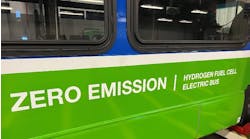PA: SEPTA Bus Overhaul Facility and Print Shop receives top Environmental Certification
SEPTA’s Environmental and Sustainability Management System (ESMS) at Berridge Bus Overhaul Facility and Print Shop in North Philadelphia has achieved ISO 14001:2004 certification.
The certification is more than two years in the making. SEPTA managers partnered with front-line engineering, maintenance, and construction staff to review daily shop activities, products, and services to ensure that they are conducted in a manner that provides environmental, health, and safety benefits to SEPTA employees and contractors.
“This certification demonstrates SEPTA’s commitment to reducing the environmental impact of our heavy industrial practices,” said SEPTA General Manager Joseph M. Casey, who added “the ISO 14001:2004 certification reinforces SEPTA’s reputation as one of the nation’s leading transit agencies, and possibly makes us contenders for additional grant and funding opportunities for which we would not have otherwise been considered for.”
In the United States, SEPTA is one of only eight transit agencies to achieve this internationally recognized certification, attained only after undergoing an independent third-party assessment process.
A specific focus was paid to the usage, storage, and disposal of environmentally sensitive materials used during the bus overhaul process. SEPTA’s bus overhaul program rebuilds more than 150 buses each year, improving the condition of each bus and extends its useful life resulting in a higher quality rider experience and lower capital costs for the Authority. “Our workforce is committed to safe, sustainable practices not only at Berridge, but in every place we operate across the Delaware Valley”, said Casey as he unveiled a special decal that will be placed on each vehicle as it completes the overhaul process at the shop. Placed by the bus entry doors, passengers will be able to scan the decal with a mobile device which will allow them to learn more about SEPTA’s sustainability programs.
“Commitment to management systems like ESMS is a cornerstone of SEPTA’s ‘triple bottom line’ approach to sustainability, which accounts for the environmental, social, and economic impacts of daily operations,” explained Scott Sauer, SEPTA’s director of system safety and risk management.
A joint effort of employees and stakeholders, SEPTA has used a three-pillar “plant, people, prosperity” approach to incorporate sustainability into the organization’s vision, mission, and core values.
Sauer says that the agency plans to implement ESMS at two additional maintenance facilities beginning in 2014.


